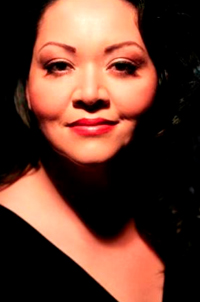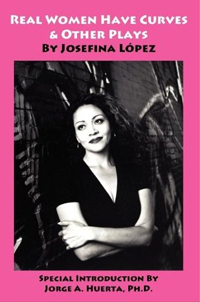This week, TheLatinoAuthor.com is featuring Ms. Josefina López. She is best known for authoring the play and coauthoring the film Real Women Have Curves which won the Audience Award at Sundance in 2002. In addition, she is the founder and Artistic Director of “Casa 0101 Theater Art Space” located in Boyle Heights, California. Read and see what has compelled her to become a success in her many endeavors as well as an award winning author.


Can you begin by telling us a little bit about yourself; where you grew up, where you currently reside, family upbringing, or anything that you would like our readers to know about you?
I was born in Mexico in San Luis Potosi and my parents brought me here to the US when I was five. I grew up in Boyle Heights which people sometimes refer to as East L.A. I grew up in a two bedroom house with seven siblings and only one bathroom. Then my aunt and uncle moved in with their eight kids. I have no issues with personal space and can tolerate chaos very well. I grew up with a father who was very macho and had to challenge so many sexist beliefs in my household. I suffered from undiagnosed depression, ADD and dyslexia. I later discovered I am an empath; a person who has the capacity to feel so much including other people’s feelings. I am very happy now being very creative, constantly taking classes, aspiring to be a chef, an artist, and an expert in the paranormal.
Did you always know that your career would be strongly centered on screen writing, television, film, and being a novelist, or was this just something that fell into your lap?
I always knew I was going to be a writer. I am very lucky because since I can remember, I have been telling stories and writing stories. At eight years old I wrote my first story so I thought I was going to be a novelist. Then I learned about Shakespeare and Luis Valdez and wanted to be a playwright. When I was 21 my play was optioned for a movie so I was thrown into screenwriting. Becoming a screenwriter happened very quickly and effortlessly. Before I knew it, I had a contract with a major studio and was a member of the Writers Guild of America. Then I got sick of Hollywood and thought about quitting and writing novels instead. So if you believe in the law of attraction, then you would believe that out of the blue an editor of a big publishing house called my manager and asked if I wanted to write novels. I pitched an idea and I got a contract. So some things did fall into my lap, but of course I worked hard so that my preparation allowed me to jump on the opportunities.
You have attained success in writing and having many of your plays produced throughout the United States. Did this achievement help to move you towards opening up Casa 0101 Theatre? Please elaborate.
No one would produce my play Real Women in Los Angles. Although it had already been produced in other cities like 19 times, no one was interested in presenting it in L.A. The fact that I had had much success with it, gave me the courage to believe I could produce the play myself (with no money) even though I didn’t know how to produce. I wanted to open a theater where I could present all my plays and also where we could tell stories about Latino and women year round. I wanted to create an artistic environment for myself and also give others opportunities. It’s clear to me now that our stories are important and we must make people care about our histories and stories by writing about them and presenting them in powerful platforms.
What are some of the challenges that you find working in the screenwriting/television/film industry that you can pass on to our readers who are just starting out in the business?
Hollywood is the most racist, sexist, ageist business in the world. You will learn soon enough that if you want to work in the business, you need to understand what they mean by “commercial.” This simply means your stories need to support the status quo with white men being the heroes and protagonists always saving the world, the day, or the movement. I do not agree with this paradigm so it’s clear to me that I need to work outside of Hollywood to tell stories that tell the truth and authentically capture the stories of those who aren’t allowed to have a voice. Writing films for Hollywood is not art, it’s a business. So if you enter the business with a clear head about what it really is, you won’t have the heartbreaks and frustrations I’ve had trying to tell my stories.
What are some of the challenges that you find when writing a novel and what advice do you have for our readers when embarking on a writing venture?
I actually like writing novels as they are easier to write than screenplays because you have the luxury of telling the reader everything you want them to know and you can use all your senses and even go into the mind of the protagonist.
However, on my last novel, I had a difficult time because I completely wanted to challenge the way women are seen when it comes to them exploring their sexuality. I found that the women giving me feedback had sexual hang ups that kept them from judging my character and my writing. Men are entitled to their sexuality without them being judged. Women, however, are kept in a box and controlled by believing our sexual desires as wrong. I was very shocked that I had to fight to keep certain words in reference to women’s sexuality. For instance I had to explain that 10% of women can actually “ejaculate.” Things like that. I am slowly working on my second novel, but I want to write it the way I want to write it without concerns that it will be too erotic to be commercial.
My advice would be to write your novel first, get it as ready as possible before you send it out to publishing houses so no editor can try to talk you out of things you believe in.
Also, start out writing novels, but always remind yourself that the novel can become a movie or a play. Try and come up with a story that lends itself to many mediums so you can get a lot of mileage from one story.
What’s a typical working day for you and how do you juggle the various projects of writing and running a theatre?
I have ADD so I don’t have a typical day because typical is so boring and it’s intolerable. The way I juggle being a mother, writer, artist, and activist is by setting deadlines and scheduling everything. I am constantly coming up with ideas so I write quick outlines and I put them away in my unconscious mind. It may take years for some projects to be ready, but a lot of the writing I do is done in the unconscious mind and if I can be extremely honest here, some of the best writing is channeled.
If you give permission to God or the divine to speak through you, sometimes you tap into the source and literary works will be written through you as long as your ego gets out of the way. The last play I wrote, Detained in the Desert, I wrote in 4 days and I felt like I was taking dictation. There are certain truths that need to be known whereas that spirit finds a way of expressing through artists.
Lastly, I am very lucky I have a wonderful husband who runs my theater so I can still have time to write. He understands my creative process and gives me the space to be the madwoman in the room lost in her head.
What was the toughest criticism you received on any of your works and what was the best compliment someone has given you?
The worst criticism I ever got was “the fact that English is my second language and that I am an immigrant” and that it has gotten in the way of me being a better writer. It was something pretty close to this from someone in a position to judge my work. I couldn’t write for two months after that! I was so hurt and angry. I’ve been in this country over 35 years and I make grammatical mistakes so she automatically assumed it’s because I am an immigrant and not just because I make grammatical mistakes like most people.
One of the best compliments I’ve gotten is when someone said that America Ferrera would not have had a career if it weren’t for me writing Real Women Have Curves because who would have hired a chunky Latina like her to play a leading role. When I was 18 years old and decided to stop acting so I could write roles for Latinas (so some Latina could make her dreams come true of being a successful actress), I realized that I had created that reality for someone like America. I had created opportunities for other talented actresses.
What is the one thing you want to be best remembered for as an author and an artist? What is it that you strive to give your audience and readers most?
That I made audiences laugh and cry within the span of seconds. I would like to be remembered for being an authentic human being who told authentic stories about what it really means to be human and helped people overcome their shame.
Thus far, which of your projects are you most fondest?
I’m fond of Real Women Have Curves because it I wrote it at 19 and yet I’m amazed by the wisdom of the message and also by the fact that it’s as relevant today as when I wrote it.
Can you tell us about any upcoming books or projects?
I am producing my first feature Detained in the Desert based on my play and I am working on the musical version of Real Women Have Curves. I wrote and I am publishing my first graphic novel named The Exorcism Team as well as writing several new plays that I plan to present at my theater in the upcoming seasons.
Visit her at: www.casa0101.org!




